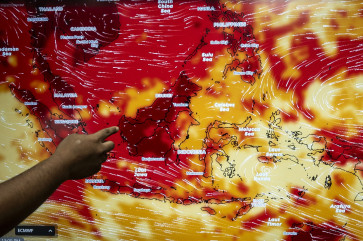Geothermal energy hangs on pricing plan
The government has said geothermal power will contribute 30 percent to its 10,000 megawatts (MW) electricity program, but investment in the clean energy source is being threatened by an unexpected pricing plan
Change Size

The government has said geothermal power will contribute 30 percent to its 10,000 megawatts (MW) electricity program, but investment in the clean energy source is being threatened by an unexpected pricing plan.
The first geothermal energy projects will be made available to investors in 2009.
Private investors developing geothermal sites in Indonesia must sell all electricity produced to state power firm PT PLN.
Under regulations issued recently by the Energy and Mineral Resources Ministry, the ceiling price for geothermal-based power is based on the average cost PLN spends producing one kilowatt of electricity (BPP) at oil, gas, coal and hydro-electrical power stations.
For geothermal plants with capacities between 10 MW and 55 MW, the price of electricity produced is set at 85 percent of PLN's BPP, while electricity produced at plants with capacities of more than 55 MW will be priced at 80 percent of PLN's BPP.
The regulation also states that production costs estimates will be based on regional BPP averages, and not on national BPP averages as had been originally thought.
Suryadarma, chairman of the Indonesian Geothermal Association, said last week a national BPP pricing system would set the price of geothermal electricity at between 7 US cents and 9 US cents per kilowatt hour (KWH).
"This range is economically feasible for businessmen. We do not take much profit from this. Within this range, our rate of return will be only 14 percent," Suryadarma said.
"If the return is only 11 or 12 percent, it will be better for us to invest our money in bank deposits or mutual fund products -- not to mention the risk-free nature of those investments," Suryadarma said.
At present, the average price of electricity produced at geothermal plants is 4.52 US cents per KWH.
Suryadarma said the price allowed for no profit margin and had hampered investment in the business.
"There have been no new geothermal projects since 1997," he said.
Bambang Praptono, director of planning and technology at PLN, said the regional BPP system, known as sub-system BPP, was more appropriate as it took into consideration risks specific to each region.
"Operating costs can greatly differ from one area to another," Bambang said.
Under the sub-system scheme, PLN divides its service areas into 22 sub-systems, each of which is comprised of between one and three provinces, resulting in a wide range of ceiling prices.

West Kalimantan's ceiling price of 21.36 US cents per KWH is the highest, while West Sumtra, Riau, South Sumatra, Jambi, Bengkulu and Lampung share the lowest ceiling price of 4.91 US cents per KWH.
Suryadarma said the sub-system scheme meant profit margins would be too low in many provinces.
He said PLN and the government must resolve the pricing matter by the end of this year, "Otherwise, the 10,000 MW project will be delayed."
Energy analyst Herman Darnel Ibrahim said PLN had chosen to reject the national-average BPP pricing system because operating conditions and potential reserves differed from region to region.
"Drilling costs in one area will not be very different compared to another area, but the production cost per KWH in an area will significantly decrease if a big deposit of geothermal is found.
"There is a speculative element here," he said, adding that PLN and geothermal producers should take this into account.
Contracts could include a clause guaranteeing a price change if a large deposit is found, he said.
Indonesia boasts a huge geothermal energy potential, with an estimated capacity of up to 27,000 MW of electricity, or equal to around 40 percent of the world's geothermal reserves.
Currently, Indonesia's 18 operation geothermal fields produce a combined 1,050 MW.









